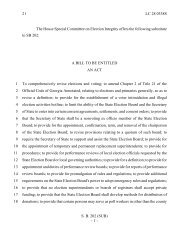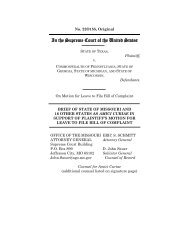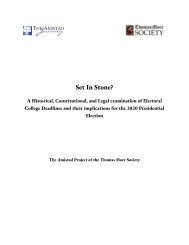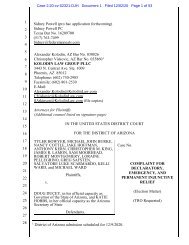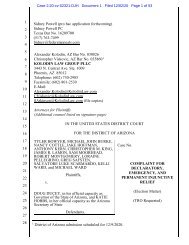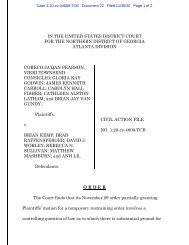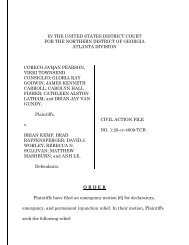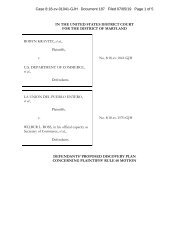Texas SCOTUSFiling
This is a doozy.
This is a doozy.
You also want an ePaper? Increase the reach of your titles
YUMPU automatically turns print PDFs into web optimized ePapers that Google loves.
39<br />
The difference between intentional acts and random<br />
and unauthorized acts is the degree of pre-deprivation<br />
review.<br />
143. Defendant States acted<br />
unconstitutionally to lower their election standards—<br />
including to allow invalid ballots to be counted and<br />
valid ballots to not be counted—with the express<br />
intent to favor their candidate for President and to<br />
alter the outcome of the 2020 election. In many<br />
instances these actions occurred in areas having a<br />
history of election fraud.<br />
144. The actions set out in Paragraphs 66-73<br />
(Georgia), 80-93 (Michigan), 44-55 (Pennsylvania),<br />
and 106-24 (Wisconsin) constitute intentional<br />
violations of State election law by State election<br />
officials and their designees in Defendant States<br />
Pennsylvania, Georgia, Michigan, and Wisconsin, in<br />
violation of the Due Process Clause.<br />
PRAYER FOR RELIEF<br />
WHEREFORE, Plaintiff States respectfully<br />
request that this Court issue the following relief:<br />
A. Declare that Defendant States<br />
Pennsylvania, Georgia, Michigan, and Wisconsin<br />
administered the 2020 presidential election in<br />
violation of the Electors Clause and the Fourteenth<br />
Amendment of the U.S. Constitution.<br />
B. Declare that any electoral college votes<br />
cast by such presidential electors appointed in<br />
Defendant States Pennsylvania, Georgia, Michigan,<br />
and Wisconsin are in violation of the Electors Clause<br />
and the Fourteenth Amendment of the U.S.<br />
Constitution and cannot be counted.




